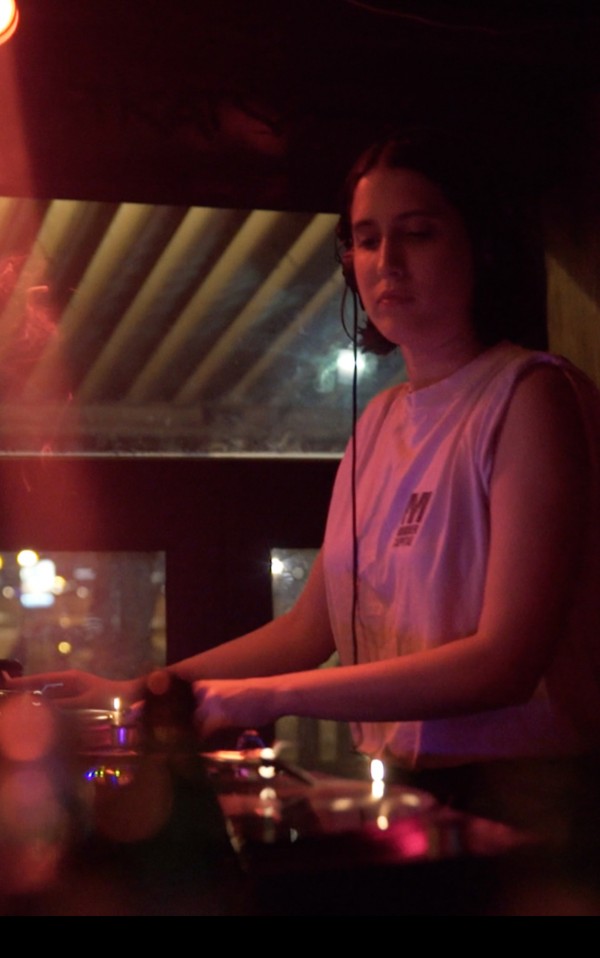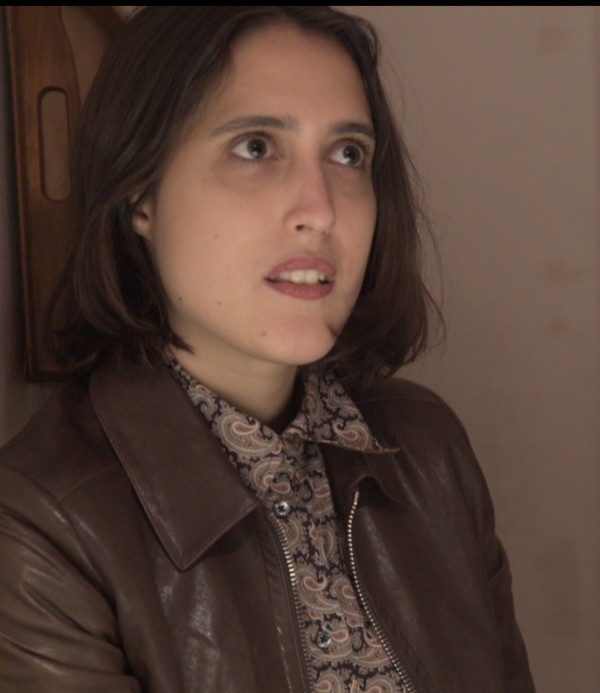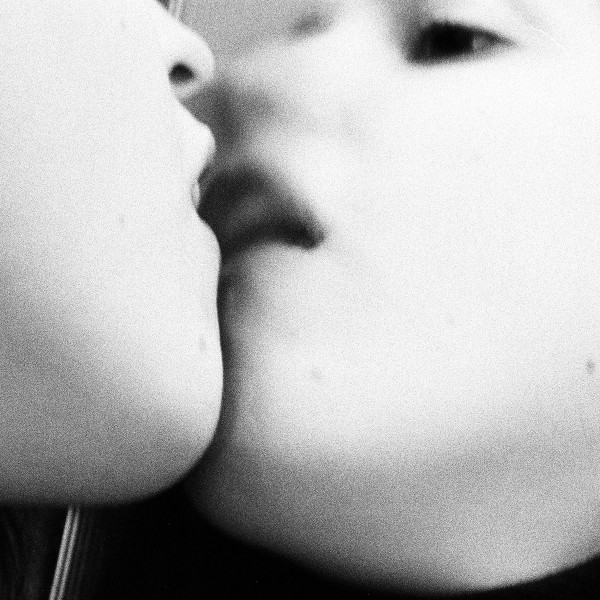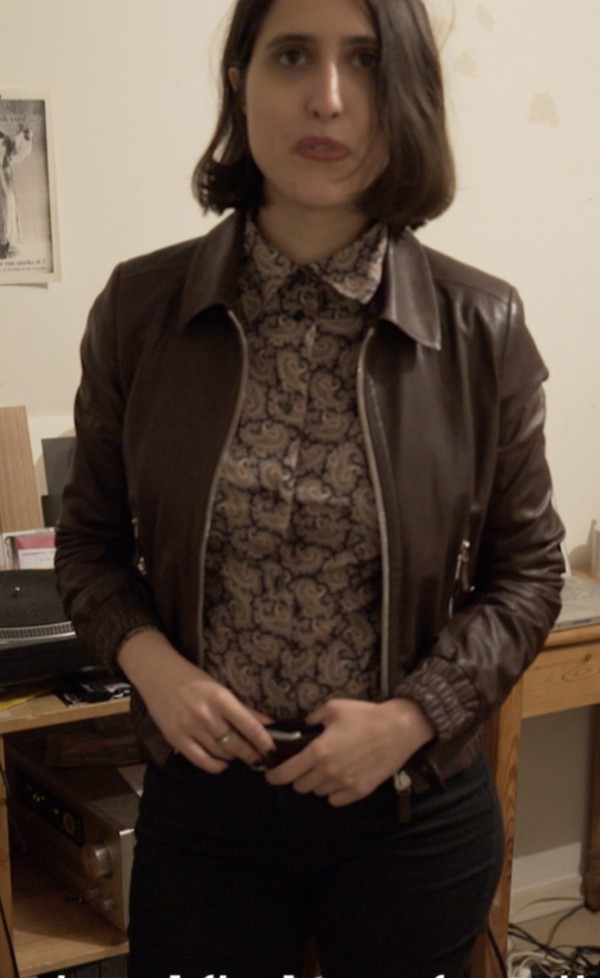“Helena Hauff is just Helena Hauff!”
With her sets and productions Helena Hauff breaks open dark, unfathomable, often even gloomy sound worlds in the area between merciless techno and energetic electro. With “Discreet Desires”her first artist album is being released on the label of Actress. For it the native of Hamburg does also dares playing with melodies. Thomas Venker visited Helena Hauff in her home studio in Hamburg, and accompanied her for one night at the Golden Pudel Club.
Helena, your name first came up in the context of the Golden Pudel Club. Is that the place, where you started out as a DJ?
It was the third place, that I ever played records at. Before that I deejayed once at some bar in Hamburg and then in some other bar, and than at the Pudel.
Your sets in their entirety are arranged rather bleak and drastic, they descend very energetically upon the listener/dancer. But lets turn the tables: How would you describe your style, if I coerced to?
That’s extremely difficult. My sets are rough, dirty, somewhat cold. Not always incredibly cold, but the mood is more coldly than warmly. Rather Italo disco than New York disco — although I don’t play a whole lot of Italo disco. What I mean is, that I’m rather representing an European sound, than an American-black sound.
Really? That’s how you perceive it? Although there is so much Detroit in your sets?
Yes — because there is admittedly not too much soul-background in my sets. It all sounds rather like Depeche Mode instead of James Brown. Great example! Nothing better came to my mind just now!
Do you mean, that you’re using the pulsating-pecking sounds from Detroit, and not the swinging sounds?
It’s rather Detroit-electro than Detroit-deep-house — whereas I’m surely influenced by both, and do listen to both. But if I had to choose a category it would definitely be electro.
You are DJing with vinyl. Therefore I wanna know twice as much, if there was something like an initial spark for you to DJ?
That’s from my aversion towards computers. I don’t really like them. What means “I don’t like them?” — they are fantastic devices, but your sitting in front of them enough. I didn’t feel like doing even more with them!
So, you didn’t see one of the big vinyl DJs, like Jeff Mills, and thought, “I wanna do that as well”?
No. Amusingly the first DJ I deliberately became aware of was playing with a laptop. I didn’t know what was happening back then! But I was immediately intrigued, that a fair amour of people were dancing to the same beat, and that the DJ seemed to play the same song for several hours at a stretch. I don’t remember who was DJing, it was a festival in a warehouse in Hamburg, that a friend made dragged me along to. I couldn’t pin it down — the idea to do this myself was fascinating to me. That’s when I began to go out more in Hamburg, oftentimes to the Pudel. So I started to see more and more DJs and slowly began to understand what was happening there. I realized quickly that there are DJs who use laptops and others who use vinyl records! I asked myself what type I would be? What I wanted to do? I wanted to do it with vinyl.
You just said, that soul isn’t your thing, but rather colder sounds. When you are DJing you are dancing along very emphatically and enthusiastically. Admittedly in your own special way, very impulsive…
I can’t really keep in time. People do tell that to me a lot.
But who can dance in step? How should that even be possible? The beautiful thing is, that everyone has his own time. […] I wasn’t at all talking about being out of time, but that you are always very concentrated while playing records, and then there is this moment where you have to let it out. You are suddenly bouncing to your music.
Oftentimes I’m quite drunk, when I’m playing records. Not always, but sometimes. It’s funny, the thing concerning time. I know this incredible Jazz drummer. Once I explained to him what DJing is all about, and how you can mix records together on the basis of 4/4 time . He immediately came up with these fantastic ideas, like how to mix a 1/360 time together with a 4/4 time, by bringing them together at the 87th place. That surely would sound like you didn’t know how to mix. I thought the idea proper, how someone who understands rhythms so much better than anyone else I know could imagine such weird stuff when dealing with records. At home I then tried to calculate how quick I had to play one record, and how slowly I had to play the other, to get the records to run parallel. Maybe then I would dance in step.
This is exactly the great talent of jazz drummers. They can drink coffee and at the same time won’t miss their cue after three minutes. But the fact that most people won’t dance, while they play records…
… is that so?
At least that’s how I perceive it, that very few people let themselves go while they are playing records and move visibly.
What I do know from myself, is that I don’t dance when I have to particularly focus on something. Nevertheless I also know, that I dance especially much when I have to distract myself from my nervousness. If people can’t let go as much, it might be due to the stage on which they are standing. You can never forget: everyone is watching you. That can be weird and awkward.
There is this very unpleasant tendency, that all people are dancing in the direction of the DJ, instead of moving freely to the music. So you can’t hardly shake the feeling that you are being watched. A state that no one really likes, besides very narcissistically inclined people.
As a DJ, in contrast to an actor who is armed with a role and a choreography, all you have as a framework are your records. That makes you pose yourself the essential question: What am I even doing here? I’m standing on a stage, playing music from other people and those 500 people are watching me. If that happens, it is starting to get strange.
But not-dancing can bug you just as much. How important is the audience as a feedback-generator for you?
Very important. If you don’t get feedback from the audience, or are not able to discern it, because the room is to big, that has a huge influence on how I’m playing. I act more secure and tighter if people are standing in front of me, who give me the feeling that they fancy what I’m doing. Without an audience there wouldn’t be DJs, they wouldn’t be needed. I like the whole dramaturgy. I like watching how the first ones that come in dance, as much as I like watching the last ones, who can hardly stand up not-dancing, falling.
Now that you mention it: As a normal club goer, in contrast to being a DJ you hardly know the closeness of the states of falling over and getting up again. Can it sometimes be disconcerting, to just have seen people falling over in one city and a couple of hours later you’re at another place, where the whole game starts all over again?
To me it is much more absurd, that after having crawled out of a club I have to go immediately to the airport to get a flight. Then you’re sitting there, between all these freshly showered business people in suits, and yourself are desperately trying not to fall asleep. You constantly have the feeling, that everyone is watching you, and is knowing what’s going on. But it doesn’t even occur to them. Living against the rhythm of this society, but using the same means of transportation is really weird.
In the system of those people you are nothing but another business traveler.
That’s what I actually sometimes think as well. I’m just like them traveling for business — if you want to put it that way. I’m traveling to gigs, and that’s what I’m getting paid for, it’s my job. But we don’t have any more in common.
What’s absurd to me, is getting out of a club around noon, completely exhausted and satisfied, and then you see the next shift already coming in. I have been socialized in era of the clubbing culture when there still was a curfew, and with it the end of the night at 5 o’clock in the morning. I’m missing the classic dramaturgy of the night, having the experience of the highlights in common.
Actually, I also do have a problem with that. I don’t like that it goes on and on. To me it’s very important for the energy of a night, that it ends when the new day begins. If that doesn’t happen I get the feeling, that everything disappears. You forget what made a specific night so special, how it felt. Everything becomes a pulp and you’re just going along. But it’s also complicated, when it ends too early, like in England or Sweden, where you have to be out of the club by 2 o’clock in the morning. On the other hand it starts getting hard for me if it goes longer than 7, 8, 9 o’clock. At hardly any place in the world you can keep an arc of suspense for so many hours.
Another thing you don’t share with the other business travelers that are on the road, is being able to smoke at your workplace. You smoke quite a lot while playing records.
I thought about making a deal with a cigarette company, because I’m advertising them so much anyway. I also had the idea, for my new label Return to Disorder, to do an industrial release with a packet of cigarettes with every record — and the label’s logo will be on the packet. That would be wonderful. But Reemtsma, who I contacted about it, didn’t fancy the idea. They don’t do individual designs, especially not in an edition of 100. Yes, I do like smoking. But sadly you can’t do that anymore in many countries.
Not even as the DJ in the club? They’re not making an exception?
I remember the first time I DJed in England. The party was already over, and nobody but the bar staff and me where inside. I thought it would surely be okay if I smoked a cigarette. The bouncer came immediately and screamed at me.
Absurd. People are taking all kinds of stuff on the dancefloor in England: poppers, ketamine, speed,… But one cigarette is not ok.
We don’t go to a health center to get wholesome. What club culture is about is going crazy together all night long, drinking some, getting up to some nonsense, and feeling shitty the next morning. The idea is to do what you are not able to do all day long: letting your hair down. That it is less and less possible is also a problem for myself. Not that I can’t go a whole night without smoking, but if people are running outside every five minutes, that destroys the club culture.
How did it get to the connection with Darren Cunningham, Actress, and his label Werkdisc?
I played as support for Actress at a party in Hamburg with my Black Sites partner f#x. We talked to each other back then, and I knew that he did like my set. One year later his label-manager contacted me out of the blue and asked if I wanted to play records in London at a release party for Actress. “What? Awesome!” And then immediately the interest for me to release with him emerged as well.
Was it immediately clear, after the 12″ “Actio Reactio”, that it should continue and lead to an album?
From the beginning I felt very comfortable at the label. I appreciate the prevailing professionalism, that it can offer as a “big” label.
On the other side, I can do whatever I want. I didn’t sign a contract for ten years and twelve albums — I wouldn’t be up for that.
It’s very nice, that he doesn’t seem to mind, that you are releasing a tape album on Handmade Birds and the new Black Sites 12″ “Prototype” on Pan so shortly before the release of your album. Earlier you told me about the tape, how you found unlabeled tapes without date or memory it in a drawer — and now you are releasing something like that so shortly before your actual record.
To be honest, I’m not sure if they approve. I hadn’t heard from them in a while, after someone quit at the label. When I got the request from Handmade Birds, I just accepted. To be fair: they don’t know about it. It’s just a small label. The tape will be limited to 100 copies. Ahem…We don’t have a contract, that prohibits me from doing anything else.
After what I have heard earlier, your record on Werkdiscs does connect to your earlier stuff. What’s striking is the balancing act between rough, sometimes distorted recordings, and rather fully produced, melody-oriented pieces, which might even work with supporting soundscapes. It comes across as very heterogeneous. On the tape with its recovered tracks this seems natural, on the other record it exudes a surprising freedom.
It’s kind of structured in the same way that I play records. I just like a lot of different things. Every time I sit down at my gadgets I try something new. Things like that just happen. The Werkdisc record feels homogenous to me, even though probably nobody hears that. Every song conveys a similar mood.
Which mood would that be?
I don’t really know. It’s just this feeling, that I don’t have a name for. There is this really great photograph, that I took a couple of years ago. On it are half opened and half closed eyes. It was my ambition to make music to this photograph. A connection which can obviously not be heard by anyone. That’s how I work anyways. No one knows what my song titles are about as well. But to me it all makes sense.
Keyphrase “that’s how I work”: On your albums there are once again several songs, that are seven minutes or longer…
….and at the same time, there are a lot very short, sketchy tracks, that are just about two minutes. The reason for that is the way that record. I don’t really arrange things, but record while I am jamming — at most I will play keyboards over it, but nothing else will be arranged retroactively. Sometimes I will lose track of times while playing, if I really like it, and suddenly 15 minutes have passed. When I started to produce I had a lot of very long tracks, because I hadn’t figured out yet how to know when to stop. The situation with the short tracks was, that I had an idea, but nothing more came into my mind. The tape actually isn’t an album, it’s rather a collection of songs.
Did the Werkdisc record come about relatively en bloc?
I completed it over seven month, with the exception of one, two tracks, which had been produced a year before that. Most of it came about over a short, intensive period.
How do I have to envision that technically: You are jamming, and recording it on tape? Or are you working with the computer, despite your aforementioned aversion towards them?
The stuff for Handmade Birds was completely recorded on tape. The tracks for the Werkdisc record on the other side were recorded with the computer, but rather because my tape deck was broken. The reel-to-reel-tape looks pretty, but it doesn’t work. I record it with Audacity, and sometimes add another track, but I don’t change anything in the actual structure. At most I cut something, if there are massive errors.
Why are you producing anyway? Where does the urge come from?
I never made that distinction. Funny is, that my first steps in production go back to the time before I started DJing. I never have talked about that before, I had pushed it out of my mind completely. There was a room at my university which had a midi keyboard and a computer with Cubase. That’s how I started making music. It was shortly after I got it, that I fancied being a DJ and making music. But I had to realize, that I can’t do it with a computer. All I saw was the empty screen in front of me — that’s when I started buying records. But I was sure, that I wanted to return to produce music. The solution was, that I had to do it the analog way, like with vinyl, instead of using the computer.
- Helena Hauff
- Dancing with her records (Photo: Thomas Venker)
You have talked about having starved your equipment together through toast and cheap cheese.
That is true. I tried to save a lot of money. Not when buying records, but for years I bought the cream that was 2 cents cheaper. I also didn’t treat myself to anything else, no clothes, no car, nor anything else you might want to treat to yourself. I never really thought about it at that time. It was so important to me, that it didn’t feel like a constraint, as some kind of asceticism. I just wanted to scrape the money together, to buy the gadgets.
You must be pleased, that that phase is over. At least the Châteuneuf-du-Pape and the single malt whisky bottles in your room convey the impression, that you like nice beverages. And it came to my ears that you appreciate calf’s brain.
As a matter of fact I do like to eat and drink well. Now that my room is filled to the brim with equipment I can make good for it, and spend all the money I earn on records and food. As soon as I call a bigger apartment with more room for new gadgets my own, I will surely buy new equipment. In the meantime I am enjoying the red wine.
Speaking of red wine, would it bother you, if I’d smoke a cigarette?
Not at all. Go ahead.
Is this really a shared apartment, as the three names on the door bell might suggest?
Yes.
I have to say, that’s really tight. Japanese conditions. Very small rooms.
Yes, I know. Do you mean Spartanic?
No, I did mean Japanese. Everyone there has about eight to then square meters to live on.
I like that: very Japanese. Fifties-German-Japanese.
Since when are you able to live from making music?
About a year. Before that I additionally worked at the bar at the Pudel.
Did you study?
I once started studying art, physics and systematic musicology. But I didn’t finish anything.
Systematic musicology?
That’s the mathematical part of musicology, that rather deals with the sound, other than the historical part, that is about the composer. They concern themselves with sound analysis, examines the way that we listen to music, analyzes how synthesizers work and learns about different musical cultures. It’s more technical and physico-mathematical, but also sociological.
That’s interesting, especially since you talked about the jazz drummer and his ideas earlier. This surely overlaps with such a way of thinking, doesn’t it?
Funnily enough, I wasn’t at all interested in the subject. I realized quickly, that I wanted to make music instead of analyzing it. A course of studies like that can probably help with it, but it’s not my approach.
Talking about making music: I came upon a quote of you, where you told about discovering music through the city library. That’s rather unconventional. Most people that know, got introduced to music through youth-cultural, social environments, like hanging out with skaters, or going to youth centers. At these places you got all kinds of new stuff thrown at you left, right, and center. Your way seems so much more tentative, questing. How much did this influence you differently?
I can’t tell you that. That’s the way I experienced it. Now it’s different. I really like it, now that I am part of a scene. There weren’t really people at my school who were interested in music. Therefore I had to go look for it myself. As a teenager I didn’t come up with the idea to go to clubs. I was a rather sluggish teenager, and hung out at home all of the time. A couch potato.
I got this list, where I recorded all of your previous projects. If I imagine, that this was my musical biography, I would probably go about compiling a concept of all my stylistic interests for my album. In your case it would be: two pretty, dark, nervous ambient tracks at the beginning, as the main thread a couple of dark-wave-techno-tracks, and towards the end acid would be thundered. That’s not how you work, but you are rather going with the flow, matching to your socialization process. Am I right?
These things just happen. Although I consciously went into a rather pop-oriented direction. It turned out less industrial, has a lot more melodies. This stems from this photograph, which I was guided by. After the first couple of tracks it was clear, that it really was material for an album.
Another thing that is remarkable in your discography: you like to co-operate with other people, but you are keeping it separate. You are producing with f#x as Black Sites on PAN, with James Dean Brown as Hypnobeat, with Kyle Hall. There was never the idea to bring these people in to help with the album production for Werkdisc to some extend, was it? Helena Hauff is just Helena Hauff, and no one else.
Helena Hauff is just Helena Hauff! But if something had emerged, that would have been okay as well. I just didn’t make music with anyone else during that time.
Earlier you talked about, approaching this jam-like process of making music impatient. When you are producing together with someone else you have to let yourself in for them to some extend.
Everyone I worked with so far, came to my room. The setup of the equipment has always been mine, and with that the way of the jam was always preset. For Black Sites f#x has brought some more gadgets, but in the end we only used mine, and the tape recorder. We didn’t use Ableton, didn’t record on several tracks. In this sense it’s similar to my solo-stuff. The big difference is the timing. When you record on your own, you solely decide when to start, when to stop, and how much a track needs. When you work with someone else everyone contributes his own temporal structure. One person just needs longer to program a bass drum then another.
Are you discursive in your collaboration?
Both are doing something, and at one point you say “stop”, “wicked”, and “let’s record this”.
Where does this affinity for the medium tape stem from?
I have cultivated a long friendship with tapes. It all started with me going to the city library from a young age, renting every CD I got my hands on, and then dubbing them on tapes. It had been like this even when I was a kid. Tape has always been my medium: it was easy to use for recordings. They are part of my life since I can remember. When I started producing with Black Sites, later on, it made for a good recording-option. We recorded a lot with tape and computer at the same time, and compared what sounded better. For some songs the compression of the tape is even helpful as a sound effect. Although for some tracks something can dwindle away, when you record it on tape.
Are you recording during the day or at night?
Not so much at night, as I don’t like working with headphones. Therefore I usually produce between 4 pm and 10 pm.
Very German.
Yes, but also not so much, because I only get out of bed at 4 pm.
Do you dance when you produce as well?
Sometimes.
Are there musical places, where you would like to hear the tracks? I mean in a mix next to which other records?
The songs are to close to me to say that. I don’t have enough distance to classify what they sound like. That is also the reason why I don’t like the music anymore — I don’t know what it is. You have been working so much on it, and during the long period until it finally gets released you are going to lose the vision of what the music represents. You wonder why you did it that way? There are a few scarce tracks, that I’m still very proud of, and that I’m still playing. For instance two songs from “Return to Disorder” on Panzerkreuz, and some from “Shatter Cone” on Lux Records, although that just got released recently.
A lot of your stuff is being released at the moment. Do you enjoy the frenzy of this timing?
I have no clue if it is reasonable, or if I should retain myself. Although that is about to happen soon, because there is not much material left in my archives, it’s nearly exhausted. Maybe it’s good that I don’t have a business plan, and that I am just doing it. Is it reasonable, that I’m releasing the record on Handmade Birds, or will I get into trouble over it with the other label?
It’s gonna be of no importance for an edition of 100. I don’t like having good stuff lying around. They are supposed to be released. But for the future it’s arguable in which pace you will create new stuff, or just can create.
I’m always releasing as much tracks as I can get finished, which agree with me. If that means I won’t release anything for two years, then that’s the way it is.
In contrast to others you are not blocking yourself against this high and diverse rate of putting stuff out. But what you are not doing, is identify yourself on social media, and actively using it. By now almost every artist finds himself constrained to share trivialities from his life with us, or has an intern do it in his name. On the one hand the industry obviously has laws, which limit the number of remixes and releases you can do, because it’s supposed to be unreasonable, on the other hand it coerces the artist to be omnipresent as far as homemade gossip is concerned.
Being on Facebook would be to personal for me. I don’t want to disclose too much from myself. What would that even be? That I’m just having a coffee in Italy, and that it tastes nice?
Yes, I’m releasing a lot. But that’s my professional side, that is the DJ Helena Hauff. You are just making your mixes, doing your “job”.
Facebook is the private person, even if you don’t reveal anything too private. But interesting observation, that’s true.
(Translation: Denise Oemcke)





















